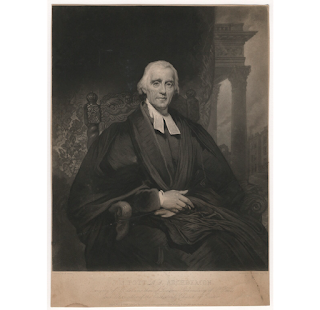"When there is little leisure for long disquisitions and debates": a Hackney Phalanx sermon for the Twenty-second Sunday after Trinity
From A Course of Sermons, for the Lord's Day throughout the Year, Volume II (1817) by Joseph Holden Pott - associated with the Hackney Phalanx - an extract from a sermon for the Twenty-second Sunday after Trinity. Preaching on the text Proverbs 2:20 - "That thou mayest walk in the way of good men, and keep the paths of the righteous" - Pott here provides an excellent example of the practical, grounded nature of Old High piety.
Emphasising the significance of "the fellowship of the sober and sincere", the sermon expounds how such friendships are a particular source of strength and guidance when, as is often the case, "there is little leisure for long disquisitions and debates". Also of note is the sermon pointing to how this fellowship anticipates - and is fulfilled - in "a fixed and perpetual concord" in heaven.
It is another example from Pott's sermons of the Old High critique of Enthusiasm and rejection of 'the Weird', for the Christian life is aided by the ordinary, routine "fellowship of the sober and sincere", not the experiences of the Enthusiasts or the practices of 'the Weird'.
The safest judgment, then, is that which is made up of consenting voices. A man may well suspect some error in his way, when he sees none before him, or beside him; but where a man's way is chosen upon reasonable grounds of knowledge and persuasion, and is commended also and confirmed to him by the choice and the suffrages of others, whose care in seeking, and whose judgment in deciding, stand clear of impeachment, there the greatest certainty prevails. We may take it then as one considerable evidence that we embrace that which is true, and follow what is profitable, when we find the truth by the self same trains of study and enquiry which others have pursued, and if we seek the benefit in the same path in which they have persevered.
Consider well what fears and jealousies will be cast out from our course in life, where our conversation and concerns are carried on among men, from whose lips we well know that all evil purposes, all fraud and deceit, are far removed; whose hearts, we have reason to believe, stand right in the fear of God, and in the wish to do his will; whose sincerity renders their least word a ground of trust, and stamps a value on their contracts and engagements beyond the best securities of legal bonds or public stipulations. How great will be the benefit, in all our course, to have such living patterns to direct us at times when, perhaps, there is more need for exertion than enquiry, and when there is little leisure for long disquisitions and debates. In such cases, who will not look to men of more practice and experience than themselves: and what experience can be so sure as that which the fear of God and the habit of integrity creates? The bare presence of such men will prove a ready source of information and instruction: they are the stars which shine where we might quickly be benighted and bewildered, if abandoned to ourselves. Their zeal will serve to rebuke our dullness; or their prudence and discretion will prove as effectual to check our eagerness, where it might otherwise exceed due limits, and prove hurtful even in a good cause ...
Do you wish to cultivate the ties of friendship in your passage through this life? It is a natural and noble wish. The herd and the flock have their tendencies to draw together; but it is without a reasonable preference, and with no generous concern for one another. The ties of mutual regard in reasonable souls, are those only which depend upon the grounds of reason, and that which has such foundations, how shall it not endure, whilst truth and reason shall continue, the source of which we know to be eternal ...
It remains only to add to what has been remarked, that the Gospel which provides so effectually for our union in one way during this life, teaches us that the same society of the good and righteous will await them with a fixed and perpetual concord in the life to come. One circumstance in the joy and pleasure of the state of happiness, as it will be made good in the scenes of future glory, is frequently described by the gladness which will accompany such fellowship with the wise and good, which shall one day be made perfect, and established in unfading bliss. If charity shall survive the wreck of this world, we may well frame the same glad expectation with regard to every bond of fellowship which serves to exercise and increase the growth of virtuous qualities and to confirm good dispositions in the day of trial.




Comments
Post a Comment